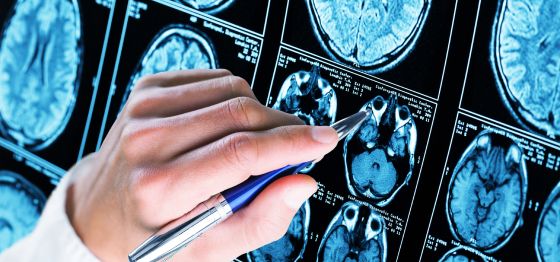Alzheimer’s disease, which affects memory, thinking and behavior, is the most common cause of dementia. In general, memory loss and other cognitive impairments are serious enough to interfere with day-to-day life—accounting for up to 80% of dementia cases.1 Although the most significant risk factor of Alzheimer’s is aging (the majority of people with this disease are age 65 and up), Alzheimer’s is not a normal part of growing older.2
Alzheimer’s is a progressive disease, meaning that its symptoms worsen over time, moving from mild memory loss to the complete inability to communicate or respond to one’s environment.3 The average life expectancy after being diagnosed with Alzheimer’s is 4 to 8 years, but depending on other factors, they may live for 20 years.4
While there is no cure for Alzheimer’s, certain treatments may temporarily slow it down, improving the quality of life for those with the disease and their caregivers.5 Research continues to look for better ways to treat Alzheimer’s and its symptoms and prevent it from developing in the first place.6
Alzheimer’s disease symptoms and stages
In 1906, a German woman died of an unusual mental illness, exhibiting symptoms including loss of memory, language difficulties and unpredictable behavior.7 After her death, Dr. Alois Alzheimer, the psychiatrist and neuropathologist who had treated her, examined her brain and found it contained many abnormal clumps and intertwined bundles of fibers—now known as amyloid plaques and neurofibrillary (or tau) tangles.8 Today, these brain anomalies are still the main indicators of the disease that bears Dr. Alzheimer’s name.9
Alzheimer’s progresses slowly in 3 grades or stages.10 The disease affects different people in varying ways, so a person may progress through the stages differently, and those stages may overlap.11 Plus, brain changes may begin years before any signs of the disease and are known as preclinical Alzheimer’s, during which a person may experience mild cognitive impairment.12
The stages below13 offer an overall idea of how abilities change once Alzheimer’s symptoms appear; this is a general guide as stages may overlap.
Early-stage Alzheimer’s (mild)
In this stage, symptoms may not be readily apparent, but the patient—as well as family and close friends—may notice subtle changes and difficulties related to:
- Identifying correct words and names of things
- Recognizing people and their names
- Carrying out tasks in social or work settings
- Citing recently read material
- Misplacing valuables
- Difficulty with planning or organizing
Middle-stage Alzheimer’s (moderate)
This is typically the longest stage and may last many years, during which one’s symptoms become more apparent, and may vary from person to person. During this period someone may be:
- Forgetful of personal history, events or information
- Confused about location or day
- Often unable to choose suitable clothes
- Struggling to control bladder and bowels
- Showing increased tendencies to wander and become lost
- Suspicious, deluded or obsessive/compulsive
Late-stage Alzheimer’s (severe)
In this final and most serious stage of the disease, Alzheimer’s patients lose their ability to carry on a conversation, control movement or respond to their environment. As symptoms continue to worsen, the patient needs extensive care and may:
- Need personal assistance 24/7
- Become disoriented with their surroundings or recent experiences
- Suffer from inability to walk, sit and swallow
- Be more susceptible to infections, especially pneumonia
- Concede to hospice/end-of-life care
In addition to the 3 stages listed above, there are also scales for grading or rating Alzheimer’s-related dementia that may provide a more comprehensive picture of the disease. These include:14
- Global Deterioration Scale (GDS), based on the amount of cognitive decline
- Functional Assessment Staging Test (FAST), based on levels of function and ability
- Clinical Dementia Rating (CDR) scale, based on thinking and functioning capabilities
Alzheimer’s disease prevention
Researchers all over the world are seeking ways to prevent Alzheimer’s disease. While there are currently no definitive answers, research has shown that reducing certain risk factors by adopting key lifestyle habits may help support brain health and prevent Alzheimer’s.15 These habits include:16
- Eating a healthy, balanced diet
- Getting regular cardiovascular exercise
- Giving up smoking and tobacco products
- Controlling diabetes, obesity and high blood pressure
- Wearing a seatbelt whenever driving
- Taking a class to stimulate brain function
- Staying socially engaged
What are Alzheimer’s treatments?
Though there is no cure for the disease, there’s been exciting progress in Alzheimer’s and dementia research creating promising new treatments.17 There are 2 categories of Alzheimer’s drugs approved by the U.S. Food and Drug Administration (FDA), which aim to temporarily lessen some symptoms and/or change the progression of the disease.18
- Cholinesterase inhibitors may be used to treat symptoms having to do with memory, thinking, language, judgment and other mental processes. The most commonly prescribed drugs in this category are Donepezil, Rivastigmine and Galantamine.19
- Anti-amyloid drugs affect disease progression by removing beta-amyloids, the protein that forms plaque in the brain. Aducanumab and Lecanemab are intravenous (IV) infusion therapies, and both are approved for use in early Alzheimer’s disease.20
Alzheimer’s disease resources for support
There’s a wide variety of information and support available on the internet for those interested in learning more about the diagnosis, symptoms and treatment of Alzheimer’s disease. Some examples include:
- Alzheimer’s Association –
www.alz.org - National Institute on Aging –
www.nia.nih.gov/health/alzheimers - U.S. Department of Health & Human Services –
www.alzheimers.gov
Go365 by Humana® makes wellness fun and easy. We help Humana Medicare members with Go365® on their plan reach health goals as well as take care of their physical and emotional health—allowing members to thrive at any age.
Humana Medicare members with Go365 on their plan can activate their Go365 account at
Go365 is a well-being and rewards program for many Humana Medicare Advantage members. Rewards have no cash value and can only be redeemed in the Go365 Mall. Rewards must be earned and redeemed within the same plan year. Any rewards not redeemed by December 31st will be forfeited.
If you need to enroll in Medicare Advantage or change your plan outside of the usual Medicare Annual Election Period, a Special Election Period (SEP) could be the answer. For information on eligibility, visit Humana’s
To learn more about Humana Medicare Advantage, call to speak with a licensed Humana sales agent at 844-321-5843 (TTY: 711), Monday – Friday, 8 a.m. – 8 p.m. local time or visit
Sources:
1“What is Alzheimer’s Disease?” Alzheimer’s Association, last accessed July 10, 2023,
2“What is Alzheimer’s Disease?”
3“What is Alzheimer’s Disease?”
4“What is Alzheimer’s Disease?”
5“What is Alzheimer’s Disease?”
6“What is Alzheimer’s Disease?”
7“Alzheimer’s Disease Fact Sheet,” National Institute on Aging, last accessed July 10, 2023,
8“Alzheimer’s Disease Fact Sheet.”
9“Alzheimer’s Disease Fact Sheet.”
10“Stages of Alzheimer’s,” Alzheimer’s Association, last accessed July 10, 2023,
11“Stages of Alzheimer’s.”
12“Stages of Alzheimer’s.”
13“Stages of Alzheimer’s.”
14“Stages of Alzheimer’s & Dementia: Durations & Scales,” Dementia Care Central, last accessed July 10, 2023,
15“Can Alzheimer’s Disease Be Prevented?” Alzheimer’s Association, last accessed July 10, 2023,
16“10 Ways to Love Your Brain,” Alzheimer’s Association, last accessed July 10, 2023,
17“Navigating Treatment Options,” Alzheimer’s Association, last accessed July 10, 2023,
18“Navigating Treatment Options.”
19“Medications for Memory, Cognition and Dementia-Related Behaviors,” Alzheimer’s Association, last accessed July 10, 2023,
20“Medications for Memory, Cognition and Dementia-Related Behaviors.”
This information is provided for educational purposes only. It is not to be used for medical advice, diagnosis or treatment. Consult your healthcare provider if you have questions or concerns.
Humana is a Medicare Advantage HMO, PPO and PFFS organization and a stand-alone prescription drug plan with a Medicare contract. Humana is also a Coordinated Care plan with a Medicare contract and a contract with the state Medicaid program. Enrollment in any Humana plan depends on contract renewal.





)
